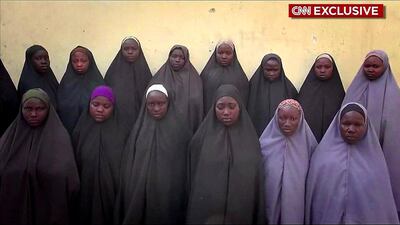LAGOS, Nigeria // A schoolmate says she cried with joy when she saw a Boko Haram video appearing to show some of Nigeria’s kidnapped Chibok girls, with images of tearful mothers recognizing their daughters who have not been heard from since the mass abduction by the Islamic extremists two years ago.
“The moment I saw them and recognized their faces – Saratu Ayuba, Jummai Mutah, and Kwazigu Hamman – I started crying, with tears of joy rolling down from my eyes, thanking God for their lives,” she says.
The young woman, who now calls herself Saa and is going to college in the United States, was among several dozen who escaped, jumping down from the back of an open truck after Boko Haram had kidnapped them. The extremists seized 276 girls who had gathered for science exams at the Government Girls Secondary School in the northeast town of Chibok. There are 219 still missing.
Angry over lack of progress to resolve one of the highest-profile mass kidnappings in the world, Nigerians marched in their country’s major cities on Thursday to demand the safe return of girls.
Nigerian vice president Yemi Osinbajo was expected in the northeastern town of Chibok for the anniversary of the kidnappings, said Yakubu Nkeki, leader of a support group of parents of the kidnapped girls. He said the community is angry that their only school remains in ruins. Boko Haram firebombed buildings as they took off with the girls.
Some 20,000 children in the town and its surroundings have no school to attend, Mr Nkeki said on Thursday as parents gathered at the ruins of the school to pray for the safe return of their daughters.
Activists calling for the return of schoolgirls said they feel “vindicated” by a video showing some of the girls alive, boosting hopes for their release.
CNN on Wednesday aired the video, believed made in December, of girls wearing the Islamic hijab, and of one mother reaching out to a computer screen as she recognizes her daughter.
“My Saratu,” she wails, before breaking down in sobs. She says Saratu was 15 when she was kidnapped and now is 17.
The video shows 15 of the girls – one with a mischievous grin, one looking uncompromising, downright defiant, and one downcast. One can feel the pain that shows in the eyes of many of them. They give the date as Christmas, December 25, 2015.
While Boko Haram is thought to have abducted thousands of people over the years, the mass abduction brought the extremist group to the world’s attention. The #BringBackOurGirls campaign went as far as the White House, used by US first lady Michelle Obama.
The failure of Nigerian officials and the military to rescue the girls brought international condemnation and contributed to president Goodluck Jonathan’s loss in elections last year.
Jonathan at first had denied there had been a mass abduction, but international pressure soon forced him to accept help from other countries.
The United States, Britain and France were among those that sent advisers, including hostage negotiators. US and British drones located at least one group of about 80 of the girls, which was reported to Nigeria’s government and military, but nothing was done.
Andrew Pocock, who was British high commissioner to Nigeria until his retirement last year, told The Sunday Times magazine last month that it was considered too dangerous to the other girls to attempt a ground or air rescue. "You might have rescued a few, but many would have been killed ... You were damned if you do and damned if you don't," he said.
Nigeria’s military has cited the same fears. Yet that has not stopped them from attacking towns and villages where Boko Haram has held thousands of civilians captive. The military boasted last week that soldiers have rescued 11,595 civilian hostages since February 26. But none was from Chibok.
CNN reported that the “proof of life” video was sent in December to negotiators trying to free the girls. It shows an interview with information minister Lai Mohammed saying the government is reviewing and assessing the video.
Senator Shehu Sani, who has been involved in past negotiations with Boko Haram about the Chibok girls, said he found the video credible.
However, a senior government source said that while the government had received the video, it was keen to avoid the problems encountered by the previous administration, which prematurely announced talks with Boko Haram elements and even a ceasefire.
“Our intelligence and security authoritie s... received a similar video in July last year and when they followed the lead it led to a cul-de sac,” he revealed.
The video ends with one of the girls appealing to Nigeria’s government to meet unspecified promises.
* Associated Press and Agence France-Presse

